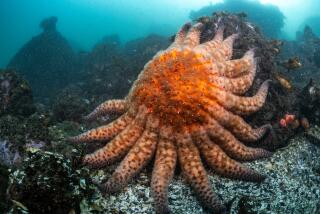VENTURA COUNTY NEWS : Fishermen May Be Consulted to Rebuild Fish Stocks : Channel Islands: Under U.S. proposal, fishers would help scientists to better protect sea life.
- Share via
Commercial fishermen would be recruited to help scientists find ways to rebuild fish stocks off the Ventura County coast as part of a new $300,000 ocean-protection program proposed by the Clinton Administration.
The plan, believed to the first of its kind in the nation, seeks to use the knowledge divers and crews of purse seiners and trawlers have accumulated over generations of fishing to help researchers explore ways to better protect sea life in waters surrounding Channel Islands National Park.
Local waters suffer from declining numbers of rockfish, abalone and other species and are the focus of concerted efforts in California to develop new fish-protection strategies, including greater use of refuges that would place waters off-limits to commercial and sportfishing fleets.
“Fishermen have a lot of expertise in behavior of fish and where they move and where they go,” said Gary E. Davis, senior scientist for Channel Islands park. “As we run out of things in the ocean, they can use their knowledge to figure out how to restore things that have already been depleted.”
Vice President Al Gore announced the plan at a meeting last week in Boston, where he received a report outlining 148 recommendations on ways to sustain economic benefits of the oceans, strengthen global security, protect marine resources and explore the high seas. The strategies, which were developed in response to a national ocean conference last year in Monterey, form the core of the administration’s effort to strengthen U.S. coastal policy.
“We have moved ocean issues up the highest levels of government, and it’s historic in that sense,” said Roger McManus, president of the Center for Marine Conservation.
In Southern California, the plan calls for training commercial fishers and deploying them during off-seasons to gather and share information, including where fish live, how they behave and habitat conditions in the Channel Islands National Marine Sanctuary, which includes waters up to six miles around the five-island park chain.
While marine biologists and fishermen often pursue the same quarry, they seldom work together. If they cooperate on the Ventura County project, the program could be used at the other 11 marine sanctuaries, said Anne Walton, spokeswoman for the Channel Islands National Marine Sanctuary. Funding will come from the National Marine Fisheries Service, she said.
“It’s a great thing to try out. The fishermen are out there on a daily basis and know a lot about those waters,” said Milton Love, marine biologist at UC Santa Barbara.
“Amazingly enough, considering how close the Santa Barbara Channel is to us, the reef systems there have not been well mapped. Can they [fishermen] in fact do credible scientific research? I have a feeling these people can do as good a job as any scientist, given they have the wherewithal.”
Zeke Grader of the Pacific Coast Federation of Fishermen’s Assns. said fishers benefit by being paid to help with research and being partners in the collection of information that will shape tomorrow’s fisheries policies.
“One of the problems we’re in today, with the collapse of fish stocks, is because we didn’t have good information,” Grader said. “This allows members of the fishing industry to stay active, it’s a lot cheaper than building new research vessels, and it will help us do a better job rebuilding our fishing stocks.”
But the program’s success will depend on how closely the California Department of Fish and Game ensures fishing boat operators are gathering information that will improve fisheries in the long haul, and not just their immediate business prospects, said Warner Chabot, director of the Pacific region for the marine conservation center.
“This is good, but the research needs to supplement and not replace work by scientists,” Chabot said. “And we need to make sure this work does not delay marine reserves, which is a good insurance policy, while we gather every available scientific fact.”
More to Read
Sign up for Essential California
The most important California stories and recommendations in your inbox every morning.
You may occasionally receive promotional content from the Los Angeles Times.













